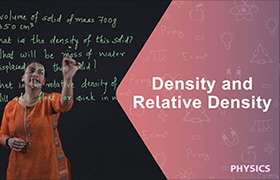CBSE Class 9 Answered
Please Define G (Universal gravitational constant) more accureately. As I am very much confused.
Asked by | 17 Sep, 2011, 12:00: AM
The gravitational constant, denoted G, is an empirical physical constant involved in the calculation of the gravitational attraction between objects with mass. It appears in Newton's law of universal gravitation and in Einstein's theory of general relativity. It is also known as the universal gravitational constant, Newton's constant.
According to the law of universal gravitation, the attractive force (F) between two bodies is proportional to the product of their masses (m and M), and inversely proportional to the square of the distance (r) between them:
F = G (mM)/R2
The constant of proportionality, G, is the gravitational constant.
Answered by | 18 Sep, 2011, 01:45: PM
Application Videos
Concept Videos
CBSE 9 - Physics
Asked by mailtoparvathyprajith | 08 Feb, 2024, 12:13: PM
CBSE 9 - Physics
Asked by harshsrivastava8896606 | 17 Apr, 2023, 01:47: AM
CBSE 9 - Physics
Asked by sknv159357 | 05 Jan, 2023, 08:29: PM
CBSE 9 - Physics
Asked by advscjaglan | 09 Aug, 2022, 08:22: PM
CBSE 9 - Physics
Asked by munendramishra478 | 12 Jul, 2022, 08:42: PM
CBSE 9 - Physics
Asked by sumantk60559 | 10 Jun, 2022, 07:18: PM
CBSE 9 - Physics
Asked by rk7213908 | 31 Mar, 2022, 12:28: PM
CBSE 9 - Physics
Asked by rk7213908 | 21 Feb, 2022, 04:48: PM
CBSE 9 - Physics
Asked by mannatjohn920 | 15 Feb, 2022, 09:57: AM
CBSE 9 - Physics
Asked by sudiptaroy0607 | 08 Jan, 2022, 04:59: PM











